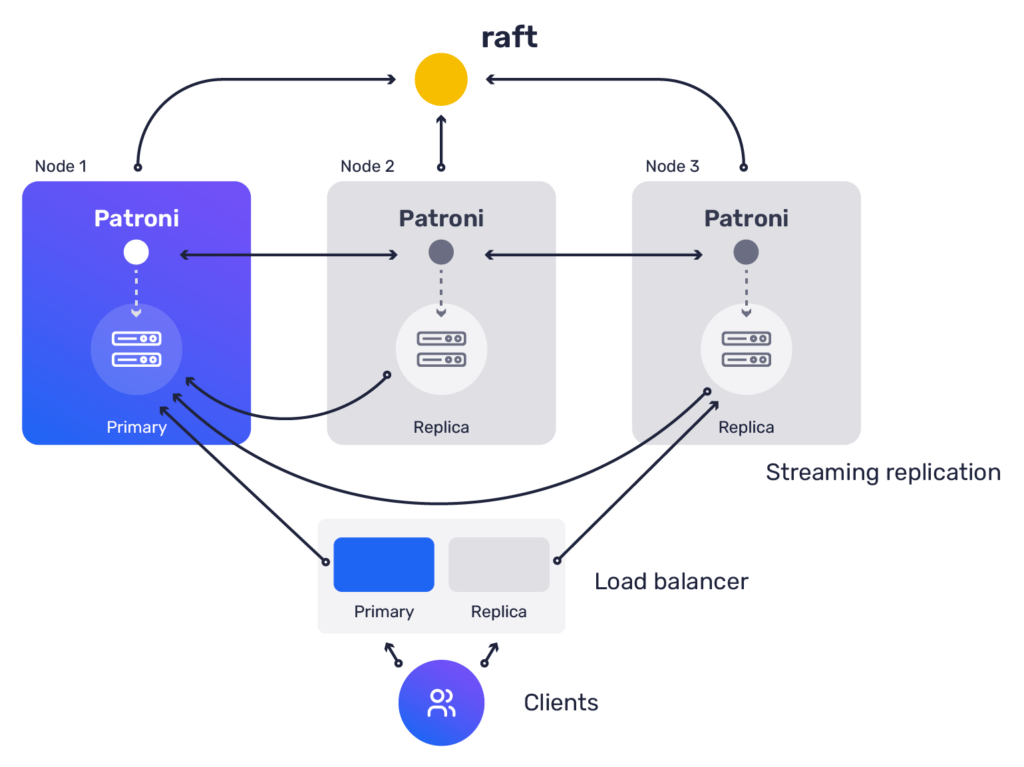DBA – PostgreSQL
PostgreSQL is a powerful open-source object–relational database management system (ORDBMS). It is used for application development, data warehousing, analysis and other data-intensive tasks. Key features of PostgreSQL include a powerful engine, support for advanced data types and indexing methods, and support for stored procedures and triggers written in various programming languages, including PL/pgSQL, Tcl, and Python. Furthermore, PostgreSQL supports multiversion concurrency control (MVCC), allowing multiple users to access the same data simultaneously without conflicts, and offers robust data integrity and security support.

Precise database management backed by experience

Reliable monitoring and notification system

Stability, availability and scalability
PostgreSQL by initMAX
We take care even of very complex operations and tuning of a wide range of databases. We offer several options for cooperation, from a simple form of traffic monitoring and possible problem notification to full database monitoring and management. We are happy to advise on how to improve the performance, security and availability of your databases. We will ensure their maximum stability and scalability. The experienced initMAX admin crew manages dozens of database servers and clusters.
Information systems of companies represent a lot of data and information – with a software solution, these are stored in the form of logs. However, working with them should not be underestimated. The basis for this is log management, so the logs could be a reliable and secure source of information about events in the corporate IT environment.

- Following trends and new database versions, including their analysis, testing, installation
- Database security setup, audit setup and its evaluation
- Design and maintenance of replication and high availability solutions (auto failover, split-brain protection)
- Performance tuning – monitoring and testing database performance and optimization, analysis of problem areas, suggesting changes
- Monitoring of redundant elements
- User account management
- Backup and Disaster Recovery scenario development
- Ensuring operational documentation of database systems
- Reliable monitoring
Advantages of PostgreSQL
The advantages of PostgreSQL for companies and organizations are mainly in the area of security and reliability of data handling. Users appreciate PostgreSQL’s broad database scaling capabilities, high performance, cross-platform support, and collaboration options via well-configured Log Management. Well-configured processes and active database management are the basis for successful and long-term work with data. Below, initMAX presents the 8 main advantages of PostgreSQL.

PostgreSQL is highly scalable, both in terms of processing large amounts of data and large numbers of concurrent connections.
PostgreSQL databases are highly extensible, i.e., they allow users to define their own data types, operators, functions and options.
PostgreSQL complies with a number of IT standards, including SQL, making it easy to integrate with other systems and tools.
PostgreSQL is open-source, i.e., you can freely use, distribute and modify it. No Vendor lock, so you don’t have to depend on one particular provider. In developing and working with PostgreSQL, initMAX will always be your maximum support.
PostgreSQL is known for its high performance, making it suitable for a wide range of data-intensive tasks such as data warehousing, business intelligence and analytics.
PostgreSQL supports multiversion concurrency control (MVCC), which allows multiple users to access the same data simultaneously without conflicts. It also supports advanced transaction and recovery management features.
PostgreSQL supports various high availability solutions such as replication, logical replication, and connection pooling.
PostgreSQL can run on a wide range of operating systems, including Windows, Linux, and macOS.
PostgreSQL Architecture Design
Depending on the requirements of the running system or application, a quality architecture with an appropriate level of availability is required. In general, all elements of the architecture should be redundant, so that they can be quickly (ideally automatically) made available to all applications. There are various ways to achieve this.
High availability is a priority for initMAX. It expresses the level of reliability of systems and services.
The high availability architecture provides higher protection against database outages compared to a single node installation. To make the right decision on which architecture will best suit your needs, you need to know what the outage tolerance is. You must choose a high availability architecture if your services are critical and your company can’t tolerate their outages. If outages are not a critical issue for these services, high availability deployment could result in unnecessary expenses and increased complexity for the particular solution.

Patroni
Another product in the initMAX portfolio is Patroni. Patroni is a python bot. Its task is to address the high availability of PostgreSQL. To do this, it uses the RAFT algorithm with external services such as Etcd or Consul. Most often, we deploy it in a mode where RAFT is implemented by Patroni itself using the pysyncobj library. To work properly, Patroni must operate from at least three servers due to protection against split-brain. Installing PostgreSQL in this way ensures high availability in case of HW or OS failure. Another advantage is the ability to patch a cluster while it is running.


- Continuous monitoring and automatic failover
- Manual or scheduled switchover with a single command
- Built-in automation to bring failed nodes back into the cluster
- REST API for complete cluster configuration and control
- It provides the information needed for transparent application failover
- Distributed consensus for all actions and configuration
- Integration with Linux watchdog to prevent split-brain
pgBackRest
PgBackRest is an open-source tool for backing up and restoring PostgreSQL databases. It is designed to provide a high-performance, reliable and easy-to-use backup solution for PostgreSQL. It can be used to create both full and incremental backups and supports a variety of storage options, including local and remote file systems and cloud storage services. Additionally, pgBackRest provides built-in support for disaster recovery and time-based recovery, making it a powerful tool for managing PostgreSQL databases. Unlike most other backup solutions, pgBackRest does not rely on tar or rsync, but implements its own way of communicating with backup systems.

- Parallel backup and recovery
- Full, differential and incremental backups
- Retention policy
- Multiple repository support
- Backup integrity
- Differential restores
- Parallel, asynchronous WAL Push and Get
- Backup encryption

